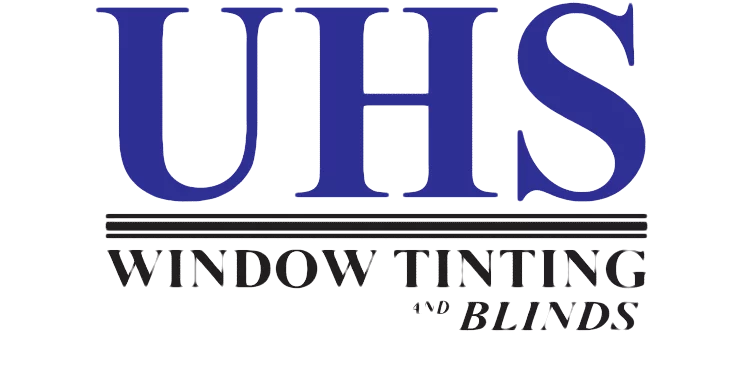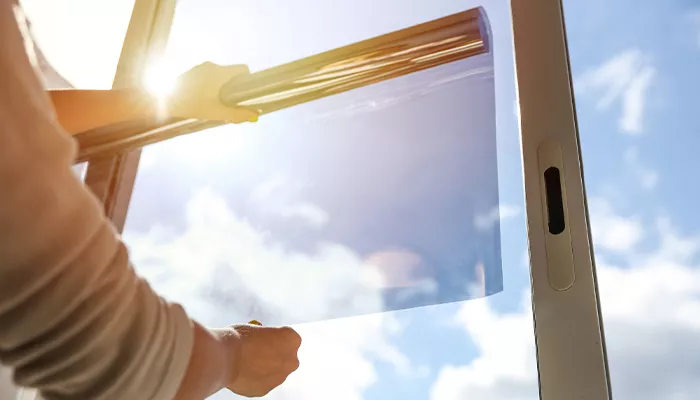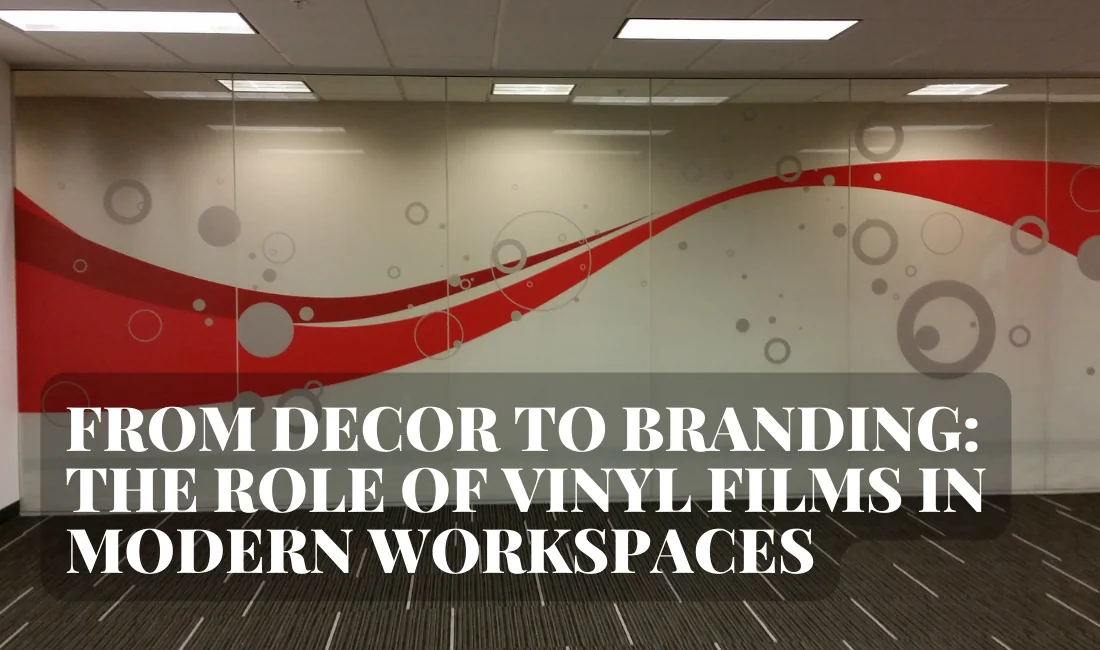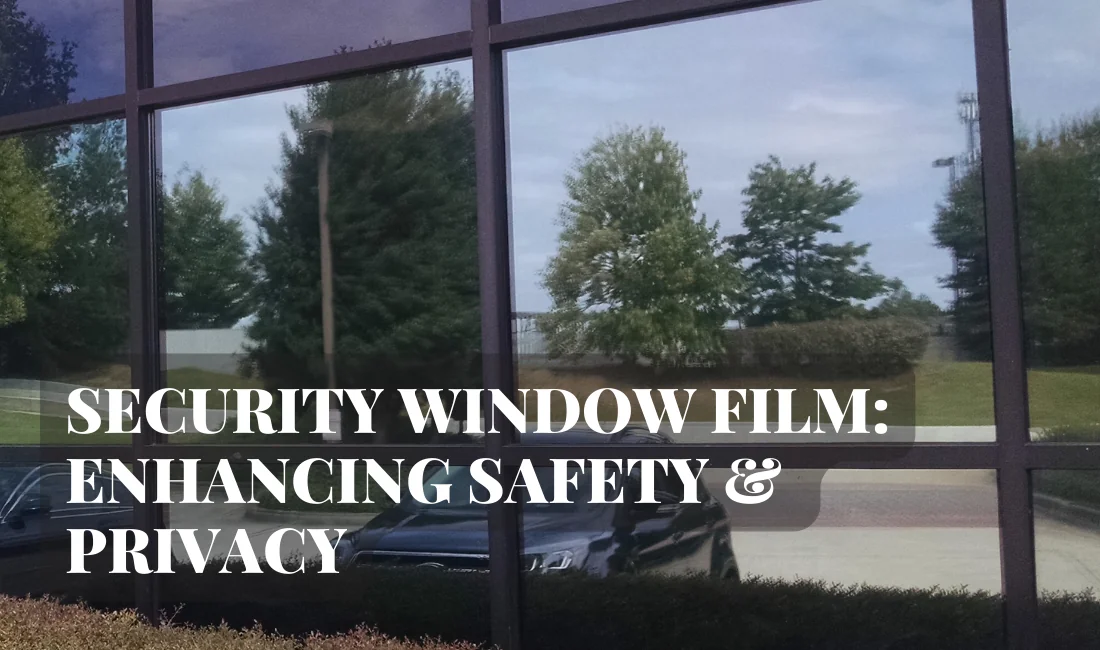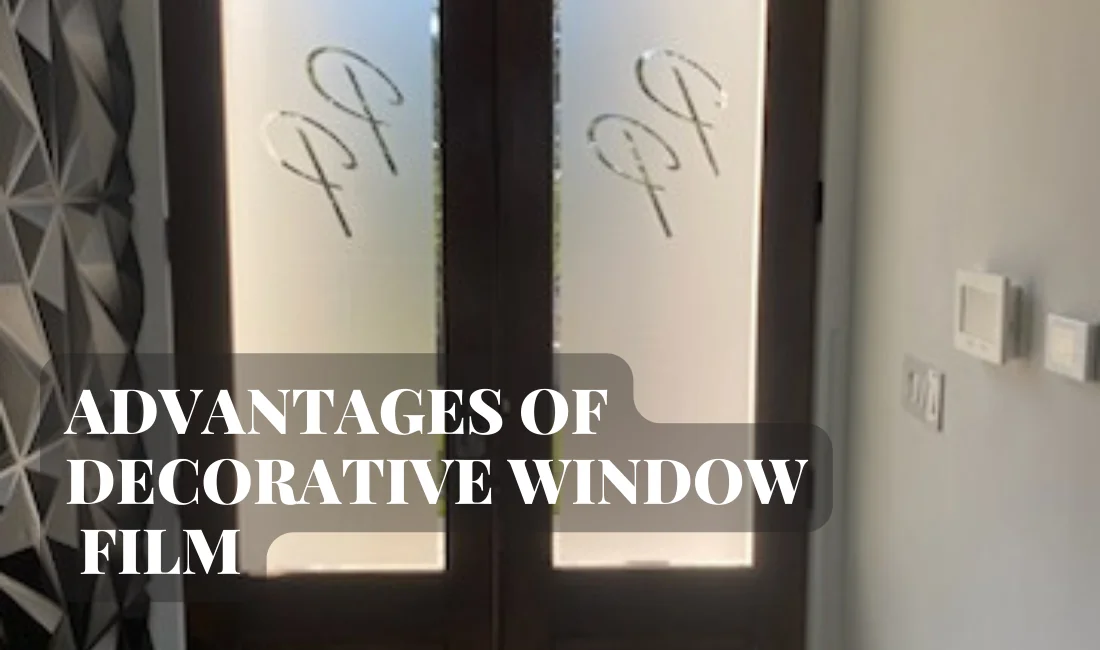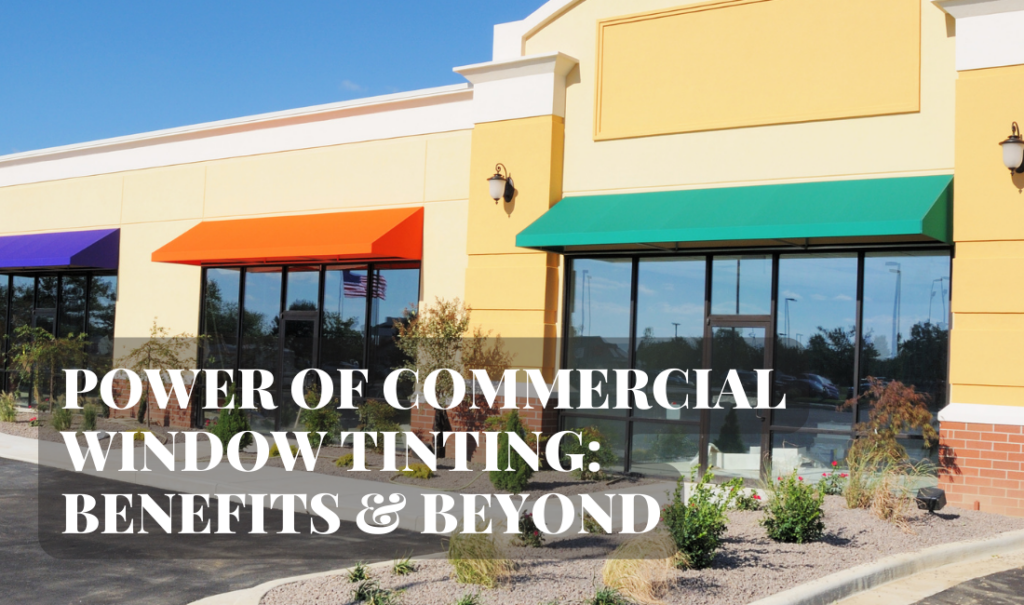
The Power of Commercial Window Tinting: Benefits and Beyond
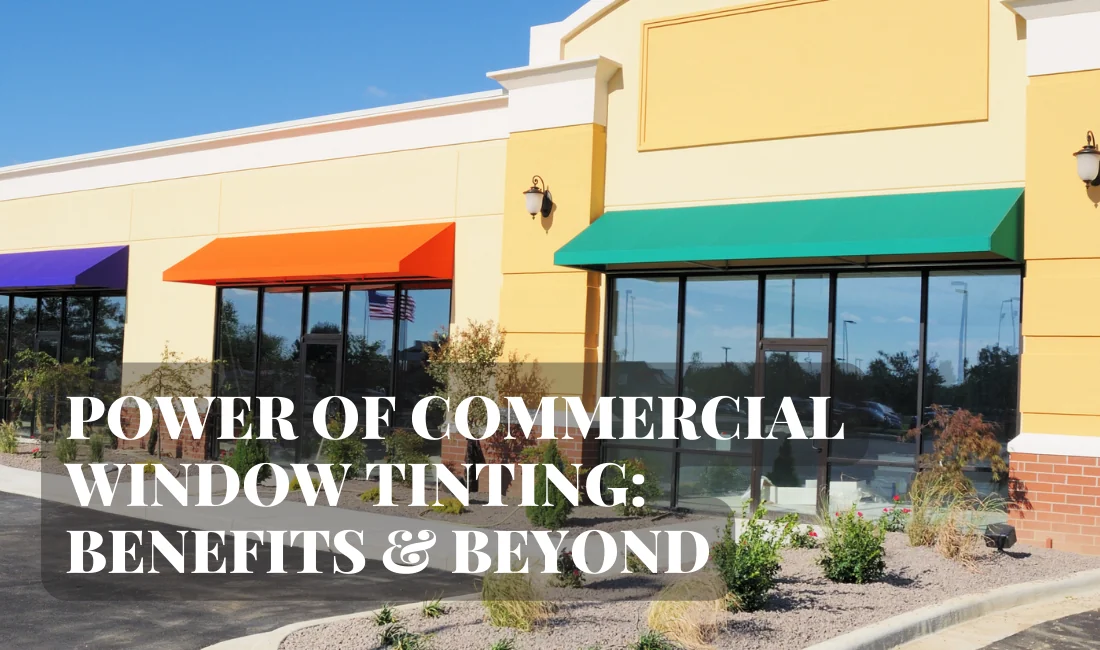
Summary
This article provides a comprehensive review of the benefits of commercial window tinting. It explains that window tinting involves applying a thin film to the glass surface of windows, which can offer numerous benefits for commercial buildings. The article discusses the rise in commercial use of window tinting and then goes on to detail the various benefits, including energy efficiency and cost savings, enhancing privacy and security, UV protection and health benefits, aesthetic appeal and branding, longevity and maintenance of windows, regulatory compliance, and sustainability. It also includes FAQs and case studies to illustrate the real-world examples of these benefits.
Introduction to Commercial Window Tinting
What is Window Tinting?
Window tinting not only enhances the aesthetic appeal of a building but also provides practical advantages such as improved energy efficiency by reducing heat gain and loss through windows. Additionally, it offers increased privacy and security for the occupants, as well as protection against UV radiation, which can fade interior furnishings and pose health risks. This modern solution has become an essential consideration in architectural design, contributing to both the functionality and sustainability of commercial spaces.
Rise in Commercial Use
This trend is driven by the realization that window tinting can significantly impact a company’s bottom line by lowering cooling and heating expenses, thus offering a quick return on investment. Moreover, by enhancing the exterior look of their facilities, businesses can create a more inviting and professional image, which is crucial in attracting and retaining customers. Additionally, window tinting helps in creating a more comfortable work environment by controlling glare and hot spots, which can increase employee productivity and satisfaction.
Energy Efficiency and Cost Savings
Reduction in Cooling Costs
This reduction in cooling costs is especially beneficial during the hot summer months, when the demand for air conditioning can lead to skyrocketing energy bills. The tinting films reflect and absorb solar energy, preventing it from penetrating the interior, which means less reliance on cooling systems and a direct impact on energy consumption and costs. As a result, businesses can enjoy a more consistent indoor climate without the heavy financial burden typically associated with keeping spaces cool.
Insulation Benefits
As for insulation benefits, the window tints form a barrier that slows down the transfer of heat through the glass. This means that during the colder months, the heat generated inside a building is retained more effectively, reducing the need for extensive heating. This dual action—keeping heat out during summer and retaining warmth in winter—makes window tinting a year-round solution for energy efficiency. The enhanced insulation properties not only contribute to a reduction in heating costs but also help in minimizing the carbon footprint of buildings, aligning with the growing emphasis on sustainable and environmentally friendly practices.
Enhancing Privacy and Security
Privacy for Employees and Clients
Privacy for employees and clients is paramount in fostering a sense of security and confidentiality, particularly in industries dealing with sensitive information. The application of tinted windows strikes a perfect balance, offering a shield against prying eyes without the need to resort to artificial lighting. This ensures that workspaces remain private and secluded, while still benefiting from the positive effects of natural daylight, which can boost mood and productivity.
Increased Security Measures
In terms of increased security measures, window films add an extra layer of protection by holding the glass together if shattered, thereby deterring potential burglars and reducing the risk of injury from flying glass fragments. This feature is particularly valuable in areas prone to severe weather or vandalism, offering peace of mind to business owners and occupants alike. Moreover, some advanced window tints come with additional security benefits, such as being difficult to penetrate or remove, adding another hurdle for unauthorized entry, further ensuring the safety of the premises and its occupants.
UV Protection and Health Benefits
Protection from Harmful UV Rays
The protection from harmful UV rays is not just about preserving the interior aesthetics of a building or extending the life of furniture and equipment; it’s fundamentally about safeguarding the well-being of everyone inside. Prolonged exposure to UV radiation is a known risk factor for several skin diseases, including skin cancer, and can cause serious damage to the eyes. By installing commercial window tints that can block up to 99% of these rays, businesses are investing in a critical health protection measure for their employees and clients, ensuring that the interior spaces are not just visually comfortable but also physically safer.
Health Benefits for Occupants
Furthermore, the health benefits for occupants extend beyond UV protection. The reduction of glare, a common issue in workspaces with abundant natural light, can significantly decrease the risk of eye strain and headaches, conditions frequently associated with prolonged computer use. This creates a more conducive work environment, promoting better focus and productivity. Additionally, by moderating the indoor climate, window tints help in maintaining a comfortable working environment, which can reduce stress levels and contribute to overall employee wellness. This holistic approach to health and safety through something as simple as window tinting can make a substantial difference in workplace satisfaction and efficiency.
Aesthetic Appeal and Branding
Modernizing Building Appearance
Modernizing the appearance of a commercial building with tinted windows not only reflects a commitment to contemporary aesthetics but also communicates a sense of sophistication and forward-thinking. This sleek, unified look can significantly enhance the building’s curb appeal, making it stand out in a competitive business landscape. The reflective or matte finishes available can transform dated exteriors into visually appealing structures, aligning the physical representation of a business with its brand identity and values.
Customization Options for Branding
Furthermore, the customization options available with window tints provide an excellent opportunity for businesses to creatively express their brand. From subtle logo imprints to custom color schemes that match the company’s branding, window films can serve as a canvas for corporate identity. This not only reinforces brand recognition but also contributes to a cohesive and immersive brand experience for clients and employees alike. By integrating branding elements directly onto the glass, businesses can achieve a unique and impactful visual statement that resonates with viewers and strengthens their market presence.
Longevity and Maintenance of Windows
Extended Lifespan of Windows
The extended lifespan of windows is a significant, yet often overlooked, advantage of window tinting. The protective film acts as a barrier against environmental elements, such as dirt, water, and debris, which can cause scratches and gradual wear over time. This protection is particularly beneficial for commercial buildings where the cost and logistics of replacing large or numerous windows can be prohibitive. By mitigating the effects of everyday exposure to harsh elements, window tinting preserves the integrity and clarity of the glass, ensuring that windows remain in optimal condition for longer periods.
Ease of Maintenance and Cleaning
Moreover, the ease of maintenance and cleaning associated with tinted windows is another practical benefit that cannot be understated. The film’s surface is designed to repel dust, water, and oils, making it less likely to accumulate smudges and fingerprints. This means that windows require less frequent cleaning, and when they do need to be cleaned, the process is quicker and requires less effort. This not only saves time and resources but also minimizes the disruption to the daily operations of a business. The reduced need for harsh cleaning agents is an added advantage, contributing to a more environmentally friendly maintenance routine.
Regulatory Compliance and Sustainability
Meeting Building Codes and Regulations
Meeting building codes and regulations is a critical aspect of commercial property management, and window tinting can play a pivotal role in ensuring compliance. Modern window films are designed to meet a variety of standards, including those related to energy efficiency, safety, and environmental protection. By choosing the right type of window tint, businesses can not only enhance the performance and aesthetic appeal of their buildings but also avoid potential legal and financial penalties associated with non-compliance. This aspect is especially relevant in regions where regulations on energy use and environmental impact are stringent. Window tints can help buildings meet or exceed these requirements, making them an integral part of a compliance strategy.
Environmental Impact and Sustainability
The environmental impact and sustainability benefits of window tints are increasingly recognized as essential by businesses aiming to reduce their carbon footprint and promote green initiatives. By significantly reducing the need for artificial cooling and heating, window tints decrease overall energy consumption, which is directly linked to a reduction in greenhouse gas emissions. This contribution to a business’s sustainability goals is not only good for the planet but also resonates positively with consumers, employees, and stakeholders who are increasingly valuing environmental responsibility. Furthermore, the longevity and durability of window tints mean fewer materials are needed over time, further reducing the environmental impact associated with manufacturing, transporting, and installing replacement windows.
Improved Comfort and Work Environment
Glare Reduction and Improved Visibility
Glare reduction is a critical benefit of window tints that enhances the comfort and functionality of interior spaces. By minimizing the intensity of sunlight that penetrates through windows, tints help to eliminate the harsh glare that can cause eye strain and discomfort, particularly in work environments where computer screens and other digital devices are frequently used. This improvement in visibility can lead to a more pleasant and efficient working or living space, where occupants can enjoy natural light without the negative side effects. Furthermore, the reduction of glare can also enhance the aesthetic appeal of the space, ensuring that views are preserved and interiors are illuminated with soft, natural light.
Temperature Control and Comfort
Temperature control is another significant advantage offered by window tints, contributing greatly to the overall comfort of a building’s occupants. By blocking a portion of the solar heat that enters a building, window tints help maintain a more stable and comfortable indoor temperature, reducing the need for constant adjustments to heating and cooling systems. This not only makes for a more pleasant environment but also improves energy efficiency and reduces utility costs. A consistent temperature is crucial for a productive work environment, as it can help reduce distractions caused by discomfort and allow employees to focus better on their tasks. Moreover, in spaces such as retail or hospitality, ensuring comfort can directly influence customer satisfaction and the overall experience.
Sound Insulation and Noise Reduction
Benefits of Sound Insulation
The benefits of sound insulation through window tinting are an often overlooked advantage that can significantly impact the ambiance of a commercial space. Specialized window films are capable of dampening sound vibrations, thus reducing the penetration of external noise into a building. This reduction in noise pollution is particularly beneficial in busy urban areas or near high-traffic zones, where the constant buzz of the outside world can disrupt the internal peace and concentration necessary for productive work. A quieter environment allows for clearer communication among employees, fewer distractions during critical tasks, and a more serene setting for both workers and clients, contributing to a more positive and efficient workplace atmosphere.
Enhancing Workplace Productivity
Enhancing workplace productivity through the use of window tints extends beyond the physical comfort provided by temperature and light control. By mitigating external noise, window tints help create an acoustically controlled environment that fosters concentration and mental well-being. In environments where focus is paramount, such as offices, libraries, and educational institutions, the ability to minimize distractions is invaluable. Employees can dedicate their attention more fully to their tasks, leading to higher quality work, greater job satisfaction, and ultimately, a more successful organization. The cumulative effect of these improvements on a business’s operations can be profound, making window tinting a wise investment in the productivity and well-being of its workforce.
Financial Incentives and ROI
Government Incentives for Energy Efficiency
Government incentives for energy efficiency play a crucial role in encouraging businesses to adopt greener practices, including the installation of window tints. These incentives can come in various forms, such as tax credits, rebates, or grants, and are designed to reduce the financial burden of implementing energy-saving measures. By taking advantage of these programs, businesses can significantly lower the upfront costs associated with window tinting, making it an even more attractive investment. Furthermore, these incentives not only underscore the government’s commitment to reducing energy consumption and combating climate change but also help businesses contribute to these goals while improving their operational efficiency and sustainability.
Return on Investment Analysis
The return on investment (ROI) analysis for window tinting presents a compelling case for its adoption. While the initial installation cost might seem substantial, the long-term savings on energy bills, reduced need for maintenance, and extended lifespan of window systems contribute to a favorable financial outcome. Businesses can typically expect to see a return on their investment within a few years, after which the cost savings become an added profit. Additionally, the intangible benefits, such as improved employee productivity and customer satisfaction due to a more comfortable and aesthetically pleasing environment, further enhance the value of window tinting. When combined with potential government incentives, the economic argument for window tinting becomes even stronger, positioning it as a strategic investment for forward-thinking businesses.
Professional Installation and Customization
Importance of Professional Installation
The importance of professional installation cannot be overstated when it comes to window tinting. A skilled installer not only guarantees that the film is applied smoothly and without bubbles or wrinkles but also ensures that the right type of tint is selected for the specific requirements of the building. This expertise is crucial for achieving the maximum energy efficiency, UV protection, and aesthetic appeal that window tints can offer. Professional installers can also provide valuable advice on maintaining the tints and extending their lifespan, further enhancing their overall value. Incorrectly applied window films may not provide the full spectrum of benefits and could lead to issues such as peeling, bubbling, or discoloration, which detract from the building’s appearance and may necessitate costly repairs or replacements.
Tailoring Solutions to Business Needs
Tailoring solutions to business needs is another critical aspect of the window tinting process. A one-size-fits-all approach is rarely effective, as different buildings have unique challenges and requirements based on their location, design, and function. Customized window tinting solutions take these factors into account, offering a variety of tints with different levels of light transmission, reflectivity, and thermal insulation to match specific goals, such as energy savings, privacy, or branding. By working with a professional to customize the window tinting solution, businesses can ensure that they receive the optimal performance from their investment, whether it’s enhancing the comfort of occupants, improving energy efficiency, or achieving a specific aesthetic look. This customization is key to maximizing the benefits of window tinting and ensuring that the solution perfectly aligns with a business’s operational needs and strategic objectives.
Is Commercial Window Tinting Right for My Business?
Making an Informed Decision
Making an informed decision about commercial window tinting involves a comprehensive understanding of both its advantages and limitations. Businesses should consider their specific needs, such as energy efficiency, privacy, security, and aesthetics, and then evaluate how window tinting can meet those needs within the context of their operational environment. Consulting with a professional can provide insights into the latest technologies and materials available, as well as help anticipate how different tints might impact the indoor environment. By taking into account factors like local climate, building orientation, and interior lighting requirements, businesses can select a window tinting solution that enhances their space without unintended drawbacks. Ultimately, an informed decision is one that balances the benefits of window tinting with any potential limitations, ensuring that the chosen solution aligns with the business’s overall objectives and enhances the comfort and productivity of its occupants.
Commercial window tinting offers a range of benefits that can significantly enhance the functionality, aesthetics, and efficiency of a building. From energy savings to improved security, the advantages of investing in window tinting are clear. As technology advances, the potential applications and benefits of window tinting are likely to expand, making it an increasingly attractive option for businesses looking to modernize and improve their facilities.
Know someone who can benefit from commercial window films?
Share this information with your network!
